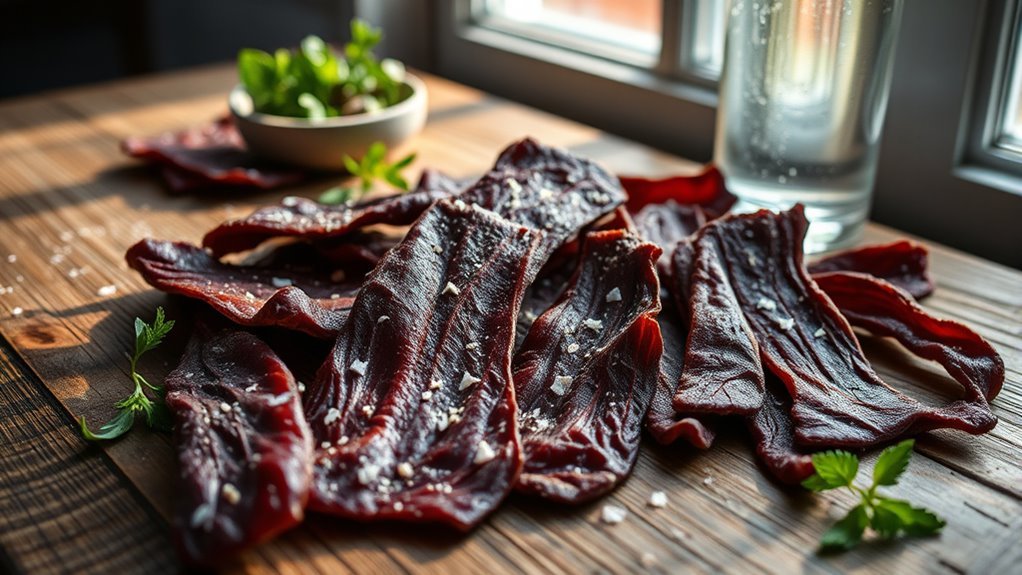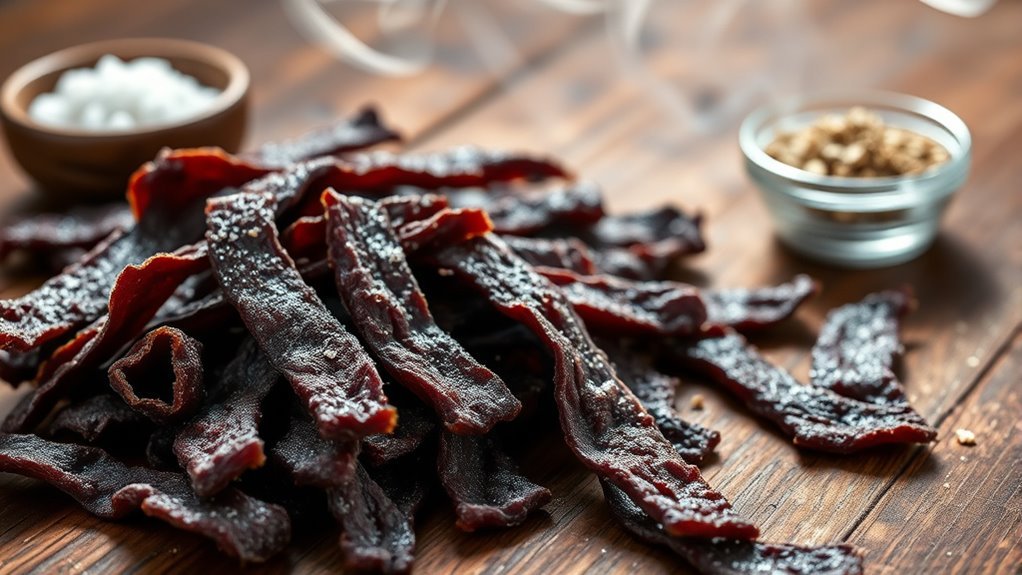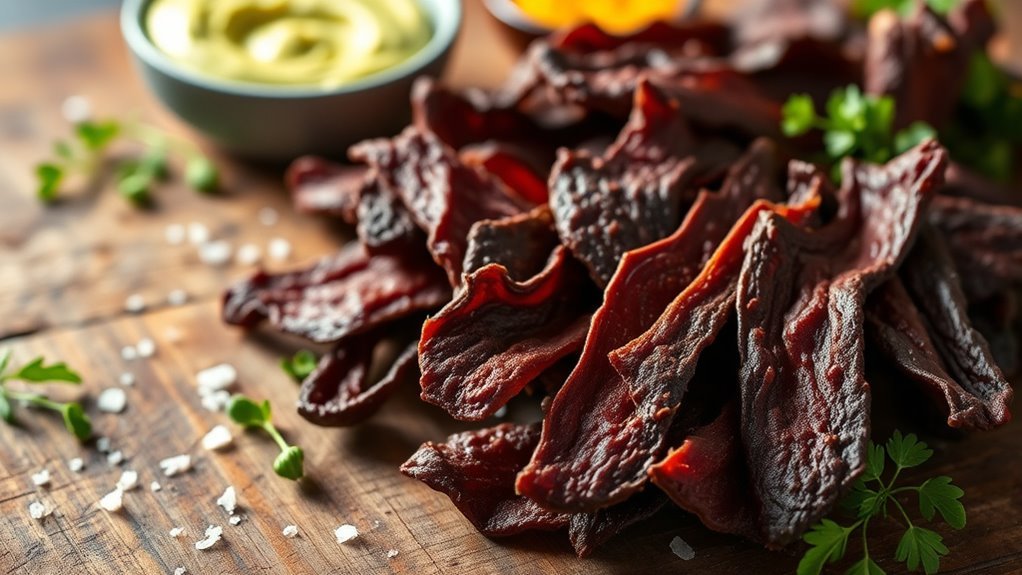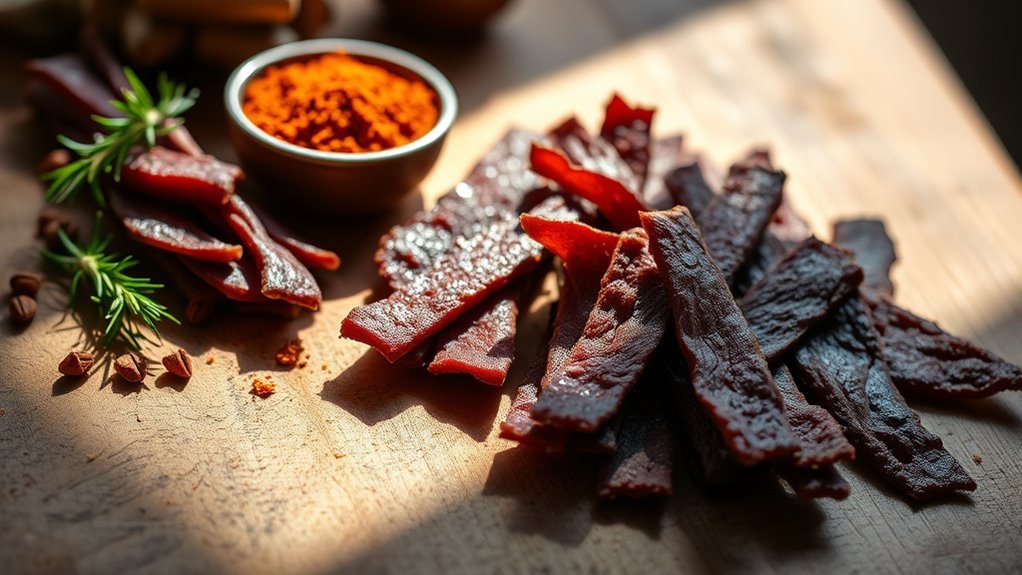Beef jerky can be a keto-friendly snack, but it’s essential to choose the right varieties. Look for options with less than 5 grams of carbohydrates per serving and minimal sugar content. Many brands use added sugars or high-carb marinades, which can affect your ketosis. Prioritize jerky made from high-quality, grass-fed beef without fillers. To make the best choices for your diet, keep exploring your options.
Understanding the Keto Diet

As you explore the keto diet, it’s essential to understand its core principles. At its heart, the keto diet emphasizes a significant reduction in carbohydrate intake, typically below 50 grams per day, while increasing your consumption of dietary fats. This shift encourages your body to enter a state of ketosis, where it burns fat for energy instead of carbohydrates. The primary keto principles involve prioritizing healthy fats—like avocados, nuts, and olive oil—while limiting sugars and starches. By understanding these guidelines, you empower yourself to make informed choices that align with your dietary goals. Embracing this lifestyle can offer freedom from traditional eating patterns, allowing you to enjoy a variety of delicious, low-carb foods while reaping the benefits of fat-based energy. Additionally, the keto lifestyle offers greater freedom in food choices and overall well-being.
What Is Beef Jerky?

Beef jerky is a popular snack that consists of dried, seasoned meat, typically made from beef. Its history dates back centuries, with ancient civilizations preserving meat through drying methods to guarantee long-lasting sustenance. Today, you can find various types of jerky, each offering unique flavors and textures. From traditional beef jerky to turkey, pork, and even vegan options, the versatility of jerky appeals to diverse tastes. The preparation methods have evolved, with modern techniques allowing for an array of marinades and spices, enhancing the overall snacking experience. Whether you’re hiking, traveling, or just craving a savory treat, jerky remains a convenient, protein-rich option that connects you to its rich heritage while satisfying your need for freedom in food choices. Additionally, beef jerky is a high protein alternative that fits well into various dietary plans, including keto.
Nutritional Profile of Beef Jerky

When you consider beef jerky, its nutritional profile is essential for understanding its role in a keto diet. You’re looking at a product high in protein, but also one that can vary greatly in fat and carbohydrate content depending on the brand and preparation method. Additionally, the sodium levels can be quite high, which is important to keep in mind for overall health and dietary balance.
Protein Content Overview
Jerky, a popular snack among many, boasts a remarkable protein content that makes it an appealing choice for those following a ketogenic diet. Typically, a one-ounce serving of beef jerky can provide around 10 to 15 grams of protein, depending on the brand and preparation method. This high protein content positions jerky as an excellent protein source, especially for those aiming to maintain muscle mass while restricting carbohydrates. Furthermore, the protein quality in jerky is often superior, as it contains essential amino acids necessary for various bodily functions. By choosing beef jerky, you’re not just indulging in a tasty treat; you’re also fueling your body with a nutrient-dense snack that supports your dietary goals effectively. Additionally, selecting varieties with no added sugars ensures that you remain within your carb limits while enjoying this convenient snack.
Fat and Carbohydrates
How does the fat and carbohydrate content of beef jerky align with keto dietary guidelines? Beef jerky typically contains low carbohydrates, usually around 3-5 grams per serving, making it an appealing snack for those following a keto diet. This low carb count helps you maintain ketosis, where your body burns fat for fuel instead of carbs. Regarding fat sources, jerky can vary; some brands include added fats or oils for flavor, while others rely primarily on the natural fat in the meat. It’s important to choose jerky with minimal preservatives and added sugars to guarantee it meets your keto needs. Overall, beef jerky can be a convenient, high-protein snack that fits well within a ketogenic lifestyle. Additionally, incorporating low sugar content options can enhance the compatibility of jerky with keto principles.
Sodium Levels Explained
Although beef jerky can be a convenient snack for those on a keto diet, its sodium levels warrant careful consideration. Typically, a single serving can contain anywhere from 500 to 800 milligrams of sodium, making it a significant sodium source. While sodium is essential for bodily functions, excessive intake can lead to health implications such as high blood pressure and increased risk of cardiovascular diseases. It’s vital to balance your overall sodium consumption, especially if you enjoy jerky regularly. Opting for low-sodium varieties can help mitigate these risks while still allowing you to indulge in this tasty snack. Always read labels and be mindful of your total dietary sodium, ensuring you maintain both health and freedom in your keto journey.
Common Ingredients in Beef Jerky
When considering the common ingredients in beef jerky, it’s essential to recognize that not all brands are created equal. You’ll often find a variety of marinade options that can markedly affect the flavor and nutritional profile. Common marinades include soy sauce, Worcestershire sauce, and even teriyaki, which may introduce sugars and other additives you might want to avoid.
Additionally, seasoning varieties play a key role in determining the jerky’s taste and potential health impact. Spices like garlic powder, onion powder, and black pepper are typical, but some brands may use preservatives or artificial flavors. By scrutinizing these ingredients, you can make informed choices that align with your dietary preferences and health goals, ensuring you enjoy beef jerky without compromising your values. Be mindful of hidden sugars that can disrupt ketosis in some jerky products.
Sugar and Carb Content in Jerky
When considering jerky for a keto diet, it’s essential to examine its sugar and carb content. Many brands add sugars for flavor, which can greatly impact your carb intake. By comparing the nutritional labels, you can make informed choices that align with your dietary goals. Additionally, be mindful of hidden carbs that may be present in processed foods like jerky, as they can affect your ability to maintain ketosis.
Sugar Levels in Jerky
How do sugar levels in jerky impact its suitability for a keto diet? High sugar content in traditional jerky can hinder your ability to maintain ketosis, as excess sugars convert to glucose. Many jerky brands use sugar or high-fructose corn syrup, which can push you out of your desired carb range. However, some brands offer jerky made with sugar alternatives like erythritol or stevia, which can minimize the impact on your ketosis. When choosing jerky for your keto lifestyle, scrutinize the ingredient list for hidden sugars and opt for products specifically labeled as low-carb. This way, you can enjoy a convenient protein snack without compromising your dietary freedoms or goals. Additionally, understanding daily carbohydrate limits is essential for making informed choices about your jerky consumption.
Carb Counts Explained
Understanding the carbohydrate content in jerky is vital for anyone following a keto diet. When you’re selecting keto snacks, you need to be aware of the carb sources in jerky. Most beef jerky contains about 3-7 grams of carbohydrates per serving, depending on the flavoring and brand. Some varieties might include added sugars or high-carb marinades, which can greatly increase their carb count. It’s important to read nutrition labels carefully to guarantee you’re making informed choices. Opt for jerky that uses natural spices without added sugars to keep your carb intake low. By understanding these details, you can enjoy jerky as a satisfying, keto-friendly snack without compromising your dietary goals. Additionally, be mindful that high-carb bean varieties can also affect your overall carb intake, so it’s essential to balance your snacks wisely. Stay informed, and choose wisely!
Comparing Brands Nutritionally
While many brands of beef jerky may seem similar at first glance, their nutritional profiles, particularly with respect to sugar and carbohydrate content, can vary considerably. Understanding these differences through brand comparisons is essential for making informed dietary choices, especially on a keto diet. Here’s a quick nutritional analysis of some popular jerky brands:
| Brand | Sugar (g) | Carbs (g) |
|---|---|---|
| Brand A | 4 | 6 |
| Brand B | 1 | 3 |
| Brand C | 0 | 1 |
| Brand D | 3 | 5 |
As you weigh your options, consider how each brand aligns with your nutritional goals, ensuring you maintain your keto lifestyle without sacrificing flavor.
Choosing Keto-Friendly Beef Jerky
When you’re on a keto diet, selecting the right beef jerky can be essential for maintaining your low-carb lifestyle. Look for jerky that has minimal carbohydrates—ideally under 5 grams per serving. Pay close attention to ingredient sourcing; opt for brands that use high-quality, grass-fed beef without unnecessary fillers or sugars. Many jerky products boast diverse flavor profiles, from spicy to savory, but always check the labels for hidden carbs. Seasonings like soy sauce or honey can sneak in sugars, sabotaging your diet. Prioritize jerky that uses natural spices for flavor enhancement. By being mindful of these factors, you can enjoy delicious beef jerky while staying true to your keto commitments, allowing you the freedom to snack wisely. Additionally, be cautious of processed lunch meats that often contain hidden sugars and fillers, which can disrupt your ketosis.
Homemade vs. Store-Bought Jerky
Whether you’re considering convenience or control over ingredients, the choice between homemade and store-bought beef jerky can greatly impact your keto journey. Store-bought jerky offers undeniable convenience, saving you time and effort. However, it often contains preservatives and hidden sugars that can derail your keto goals. On the other hand, homemade jerky benefits include complete control over the ingredients, allowing you to customize flavors and guarantee it aligns with your dietary needs. Plus, you can select high-quality, keto-friendly marinades. Ultimately, weighing the trade-offs of store-bought convenience against the superior quality of homemade options can help you make an informed choice that suits your lifestyle and keto objectives.
Creative Ways to Enjoy Beef Jerky on Keto
Although beef jerky is often enjoyed as a simple snack, there are numerous creative ways to incorporate it into your keto diet that can enhance both flavor and nutritional value. Here are three innovative ideas for beef jerky snacks and jerky pairings:
- Cheese and Jerky Platter: Pair your jerky with high-fat cheeses like cheddar or gouda for a satisfying, low-carb treat.
- Jerky Salad Topping: Chop jerky into bite-sized pieces and sprinkle it over leafy greens, adding protein and crunch to your salad.
- Jerky-Stuffed Avocados: Fill avocado halves with cream cheese and diced jerky for a delicious, nutrient-dense snack. Including high protein content in your meals can help support muscle maintenance and satiety on your keto journey.
These creative combinations not only diversify your meals but also keep your taste buds excited while sticking to your keto lifestyle.
Potential Health Benefits and Drawbacks
Incorporating beef jerky into your keto diet can offer several health benefits, but it’s also important to evaluate potential drawbacks. Jerky is high in protein, which can support muscle maintenance and satiety, making it a great snack for keto enthusiasts. However, it’s vital to choose jerky with minimal additives and preservatives to avoid excessive sodium and sugar. These can pose health risks, particularly for those with high blood pressure or kidney issues. Additionally, while jerky can be convenient, relying on it too heavily may lead to dietary imbalances. Practicing dietary moderation is essential to guarantee you’re getting a variety of nutrients. Balancing jerky with other whole foods will help you enjoy its benefits without succumbing to potential health pitfalls.
Frequently Asked Questions
Can Vegetarians or Vegans Consume Beef Jerky Alternatives?
Yes, vegetarians and vegans can enjoy beef jerky alternatives. There are plenty of meat substitutes available that mimic the texture and flavor of traditional jerky. You’ll find plant-based options made from soy, mushrooms, or seitan, often seasoned to create an authentic taste. These alternatives not only cater to your dietary preferences but also offer a satisfying snack without compromising your lifestyle choices. So, you’ve got delicious, guilt-free options to choose from!
How Long Does Homemade Beef Jerky Last?
Homemade beef jerky can be like a fine wine; its quality depends on how you store it. Typically, if stored in an airtight container in a cool, dark place, it can last 1 to 2 months. For longer shelf life, consider vacuum sealing and refrigerating it, which can extend freshness up to 6 months. Remember, proper storage tips are key to enjoying your jerky without compromising its flavor and texture.
Is Beef Jerky Safe for Children on a Keto Diet?
Yes, beef jerky can be safe for children on a keto diet, as long as it fits within keto guidelines and is consumed in moderation. It’s rich in protein and low in carbohydrates, which aligns with the keto approach. However, you should consider your child’s overall nutrition, ensuring they get a balanced diet. Always check for additives or preservatives that might not align with healthy eating, and choose high-quality, natural options.
Can I Eat Beef Jerky While Intermittent Fasting?
You can eat beef jerky while intermittent fasting, but it’s best to do so during your eating window. Beef jerky’s nutrition is high in protein and low in carbs, making it a satisfying snack. Intermittent fasting benefits include improved metabolism and mental clarity, so if you choose beef jerky, opt for natural varieties without additives. Just remember, moderation is key to guarantee you’re maximizing the health benefits while enjoying your freedom in food choices.
What Are Common Allergens in Beef Jerky?
Beef jerky can contain common allergens like gluten and soy. If you have gluten sensitivity, look for brands that specify “gluten-free,” as some may use soy sauce in their marinades, which can trigger reactions. Additionally, those with soy allergies should avoid jerky made with soy-based ingredients. Always check labels for potential allergens to ascertain you’re making a safe choice that aligns with your dietary needs and preferences. Stay informed and enjoy your freedom to choose!
Frequently Asked Questions about Beef Jerky and Keto
1. Is beef jerky keto-friendly?
Yes, beef jerky can be keto-friendly as it is primarily made from meat, which is low in carbohydrates. However, the carb content can vary based on the brand and any additional ingredients used, such as sugars or preservatives. Always check the nutrition label to ensure it aligns with your daily carb limits on a ketogenic diet.
2. How many carbs are in beef jerky?
The carbohydrate content in beef jerky can vary widely based on the flavoring and ingredients. On average, a serving of beef jerky (about 1 ounce) may contain between 1 to 5 grams of carbs. Always look for jerky products that are labeled as “low sugar” or “no sugar added” to keep your carb intake minimal.
3. Can beef jerky be a good snack for a ketogenic diet?
Absolutely! Beef jerky is high in protein and can be a convenient and satisfying snack for those following a ketogenic diet. It can help curb hunger and provide the necessary nutrients without significantly increasing your carb intake. Just be mindful of portion sizes and choose jerky brands that fit your dietary preferences.
4. What should I look for when buying keto-friendly beef jerky?
When shopping for keto-friendly beef jerky, look for products that have:
- Low carbohydrate content (ideally less than 5 grams per serving)
- No added sugars or sweeteners
- Natural ingredients without preservatives or artificial flavors
- A high protein content to help satisfy hunger
Reading nutrition labels and ingredient lists can help you make informed choices.
5. Are there any health considerations when consuming beef jerky on a keto diet?
While beef jerky can be a healthy high-protein snack, moderation is key. Some jerky products can be high in sodium or preservatives, which may not be ideal for everyone. Additionally, excessive intake of processed meats has been linked to certain health risks. It’s important to balance your diet with fresh, whole foods and consult with a healthcare provider if you have specific dietary concerns.
References
- https://www.healthline.com/nutrition/keto-diet-foods
- https://www.ncbi.nlm.nih.gov/pmc/articles/PMC6520887/
- https://www.dietdoctor.com/low-carb/keto
- https://www.webmd.com/diet/what-is-the-keto-diet
- https://www.verywellfit.com/what-is-the-keto-diet-5111270
- https://www.usda.gov/
- https://www.cdc.gov/healthyweight/healthy_eating/index.html
- https://www.mayoclinic.org/healthy-lifestyle/nutrition-and-healthy-eating/expert-answers/keto-diet/faq-20427915


